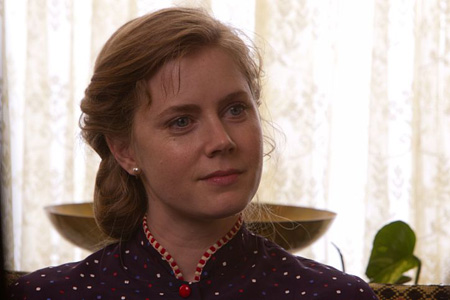New York‘s annual “Fall Preview” issue is out this week, but before poking around in it, I want to point out a piece Jonathan Chait: “Two decades ago, conservative anger against popular culture burned so intensely that it seemed at the time that Hollywood had come to fill the space in the right-wing fear center vacated by the end of Communism.” Perhaps, he suggests, that “culture war has been shoved aside by the war over the role of government in the economy. The more uncomfortable reality is that the culture war is an ongoing liberal rout. Hollywood is as liberal as ever, and conservatives have simply despaired of changing it.” See if you can follow his line of reasoning.
Back to the fall. Tom Shone talks with Amy Adams about her role in Paul Thomas Anderson’s The Master, and Jada Yuan phones up Marion Cotillard to chat quickly about Jacques Audiard’s Rust & Bone and her husband Guillaume Canet’s Little White Lies. Yuan also has a few questions for John Hawkes about Ben Lewin’s The Sessions. And: “Five New Movies David Edelstein Really Wants to See.”
Time‘s got a “Fall Arts Preview” as well, but it’s one of those irritating one-item-per-page click-a-thons.
In other news. At Cineuropa, Jorn Rossing Jensen reports on the Amandas, Norway’s national film awards. Jannicke Systad Jacobsen’s Turn Me On, Goddammit! won Best Feature and Best Cinematography, Joachim Trier’s Oslo, August 31st took Best Director and Best Editing, and Pål Sletaune’s Babycall, “which had nominations for nine Amandas, cashed in on four, including Best Actress—Sweden’s Noomi Rapace, who plays an over-protective mother, whose babycall is activated from other apartments in the block, and one day she overhears what she thinks is the murder of a child.”
Reading. Christopher Nolan “is, I think all parties will agree, an innovative filmmaker,” writes David Bordwell. “Some will argue that his innovations are feeble, but that’s beside my point here. His career offers us an occasion to think through some issues about creativity and innovation in popular cinema.”
The work of Matías Piñeiro “has been compared—at least by a small handful of critics in this country—to early Jean-Luc Godard and Jacques Rivette, to a cinema invariably talk-heavy and high-energy, to films about the young and the playful, the urban and the prolix.” But, writing in MUBI’s Notebook, Ricky D’Ambrose argues that “one doesn’t have to be familiar with the pop politics and pop tones of Godard’s Sixties, or with Rivette’s treatment of role-playing and the theatre, to be in tune with, to understand Piñeiro.”
Nicholas Rombes for Berfrois: “Rather than clarifying, high definition realism—as a synecdoche for the desire for clarity, forthrightness, assessment, and the entire cultural mania for visibility—obscures rather than makes visible the desire to see everything, to control everything.”
Victoria Large introduces a new series at Not Coming to a Theater Near You on Gene Kelly.
Film International posts the first part of Wheeler Winston Dixon‘s study of “Dark Humor in Films of the 1960s.”
In the works. Ken Watanabe will star in a Japanese remake of Clint Eastwood’s Unforgiven, reports Cain Rodriguez at the Playlist.
More browsing? Michael Atkinson‘s begun tumbling.
For news and tips throughout the day every day, follow @KeyframeDaily on Twitter and/or the RSS feed. Get Keyframe Daily in your inbox by signing in at fandor.com/daily.




